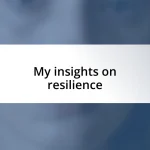Key takeaways:
- Failure is a crucial teacher that drives personal growth and resilience; embracing it can lead to rewarding outcomes.
- Effective failure analysis involves reflecting on emotions, gathering feedback, and identifying patterns for improvement.
- Learning from failures fosters teamwork and accountability, ultimately enhancing future project success.
- Resilience is strengthened through confronting setbacks and building connections, transforming challenges into opportunities for growth.
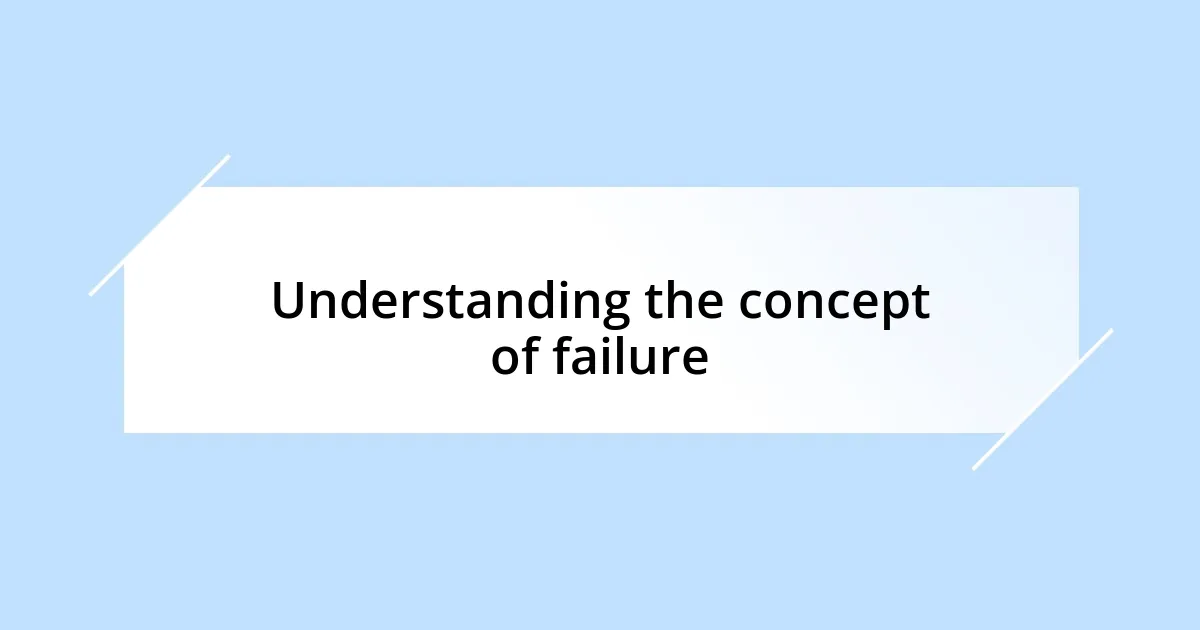
Understanding the concept of failure
Failure often feels like a heavy weight on our shoulders, but it’s essential to recognize that it’s not the end; rather, it’s a teacher in disguise. I remember my first failed project at work, where I had poured my heart and soul into a presentation that flopped. The feelings of disappointment were overwhelming, but looking back, I realized those moments were crucial for my growth and helped me refine my approach.
What does failure really mean in our lives? It’s easy to view it as a roadblock, but I’ve come to see it as a stepping stone. When I faced rejection from a job I felt I deserved, I questioned everything about myself. Yet, that period of introspection led me to discover new passions and skills that I had overlooked—like diving into a completely different industry. Isn’t it fascinating how sometimes, the paths we least want to walk lead us to the most rewarding destinations?
In the end, understanding failure is about embracing it. I learned that it’s my reaction to failure that defines my journey. Each setback has nudged me toward resilience—a quality I now cherish. What if we considered every failure a part of a larger story, one that ultimately shapes us into who we need to be? That shift in perspective can be incredibly liberating.
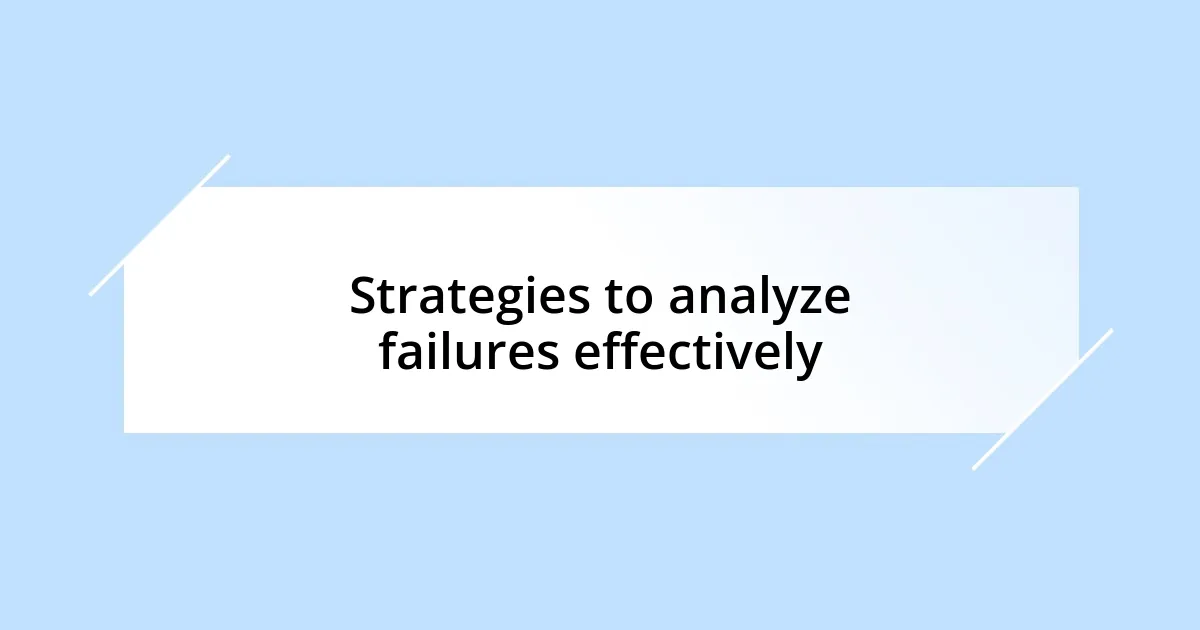
Strategies to analyze failures effectively
Analyzing failures isn’t just about identifying what went wrong; it’s also about exploring the emotions and reactions tied to those experiences. One time, I had to reevaluate a failed marketing campaign that I was so excited about. Instead of just chalking it up to bad luck, I sat down and allowed myself to feel the frustration. From there, I could pinpoint that the messaging didn’t resonate with my audience. Embracing those emotions paved the way for deeper insights and helped me create a more impactful strategy next time.
To analyze failures effectively, consider the following strategies:
-
Reflect on Emotions: Take time to understand how the failure made you feel and why those emotions matter. They often hold clues for improvement.
-
Break Down the Process: Deconstruct the steps you took leading up to the failure. What assumptions were made that might have led to the outcome?
-
Gather Feedback: Ask for feedback from colleagues or mentors. Sometimes, an outside perspective reveals blind spots you didn’t see.
-
Identify Patterns: Look for recurring themes in your failures. Identifying these patterns can help you make adjustments moving forward.
-
Set Specific Goals: Establish clear, actionable goals for your next attempt. Specificity can make a huge difference in staying focused.
By applying these strategies, you can transform failures into valuable learning experiences.
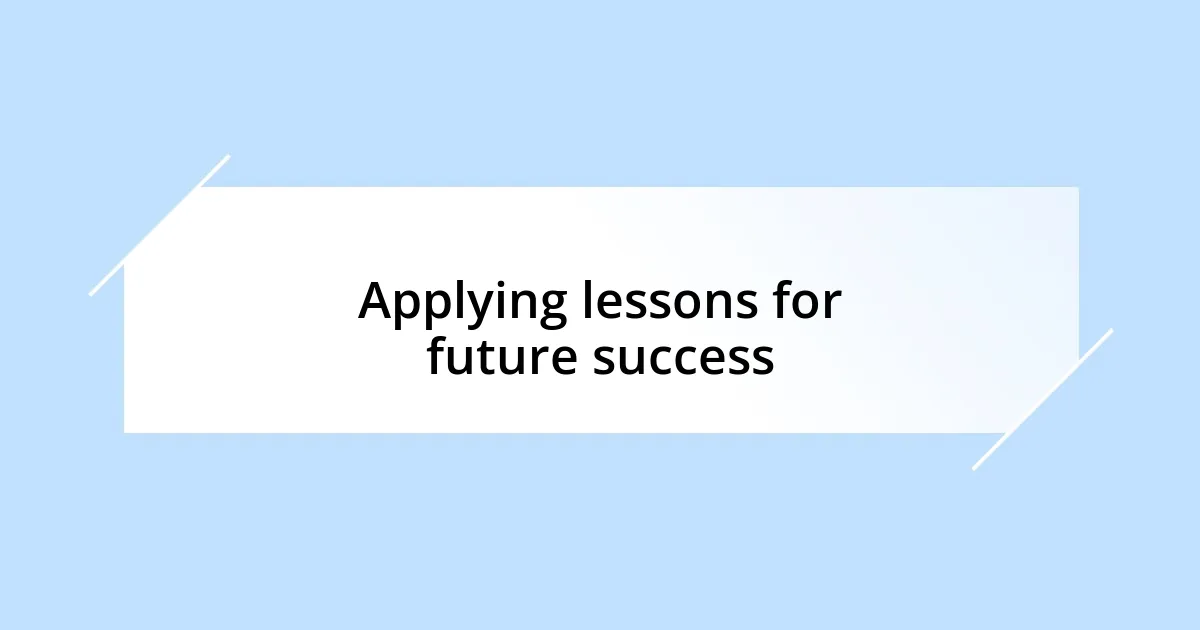
Applying lessons for future success
Applying the lessons learned from failure is essential for future success. For instance, after facing a significant setback in my freelance work, I realized that adapting my approach was critical. Instead of dwelling on disappointment, I took a hard look at why my proposal didn’t resonate. I discovered that I hadn’t fully understood my client’s needs. This insight shifted my focus on conducting thorough research before crafting any future proposals.
I’ve found that embracing change often leads to growth. One memorable experience was when a product I launched failed to gain traction. Initially, it was disheartening. However, by experimenting with different marketing strategies based on feedback, I eventually created a revised version that exceeded our expectations. It was a powerful reminder that even failure can lead to something extraordinary when we’re willing to pivot and learn.
Learning from past experiences not only shapes our future endeavors but also builds resilience. I remember a time when my team faced a project deadline that we failed to meet. Instead of pointing fingers, we convened to discuss what went wrong collectively. That moment fostered a sense of accountability and collaboration among us, leading to stronger teamwork in our subsequent projects. By acknowledging our failures, we became more unified and focused on achieving our goals.
| Lesson Learned | Application for Future Success |
|---|---|
| Embrace Adapting Strategies | Conduct thorough research before approaching new projects. |
| Experiment and Pivot | Use feedback to refine products and marketing strategies. |
| Cultivating Team Unity | Foster accountability and collaboration after setbacks. |
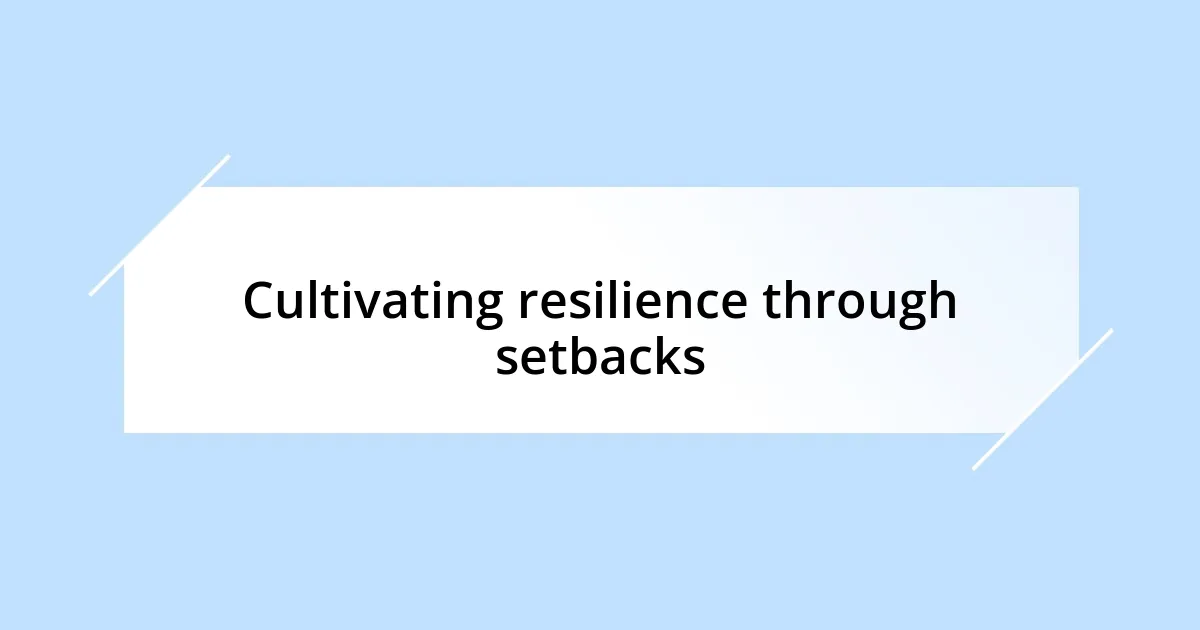
Cultivating resilience through setbacks
Resilience is often built in the aftermath of setbacks. I recall a time when a project I poured my heart into didn’t meet expectations. The disappointment was palpable, but rather than wallowing in defeat, I focused on how it forced me to recalibrate my approach and learn from my mistakes. Isn’t it fascinating how some of our toughest moments can turn out to be the very foundations of our growth?
When facing failure, I’ve found that it’s essential to confront the discomfort head-on. There was a moment when a pitch I was confident about fell flat. Instead of brushing it off, I dug deep into my discomfort. I realized it wasn’t just about the idea; I hadn’t connected with my audience personally. That realization ignited a spark within me to forge stronger relationships and truly understand the people I was addressing. How much could we gain if we viewed each setback as an opportunity to strengthen our connections?
Embracing setbacks has taught me that resilience is like a muscle — it needs to be exercised. After a team presentation didn’t go as planned, I decided to gather everyone for a constructive dialogue rather than let the tension brew. Sharing our feelings openly created an atmosphere of trust and strengthened our collaboration. Isn’t it empowering to recognize that vulnerability can fuel resilience? Each setback became a stepping stone, transforming how we approached our work and supported one another moving forward.











